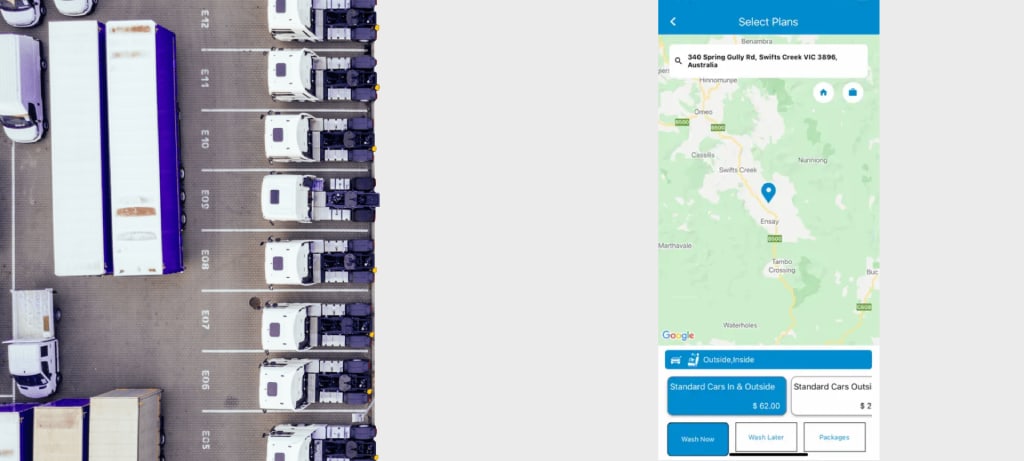Logistics App Development Cost, Features & Tech Stack
An Introduction to Developing a Transportation and Logistics App Business

Logistics is the process of planning, organizing, and executing the movement of goods and materials between locations. Logistics involve managing inventory, managing transportation assets (such as trucks), managing processes such as receiving, production or distribution. A logistics company manages all the functions necessary to ensure efficient delivery or transport of goods from place to place across an organization's networks while maintaining profitability. By using an application development platform like Microservices World Platform (MWP), you can build a highly functional and flexible app that fits seamlessly within your business operations and helps improve efficiency across multiple departments within your organization.
Logistics technology is surging with more and more daily online and offline customers depending on it.
Logistics technology is surging with more and more daily online and offline customers depending on it. The logistics industry is growing at a rapid rate, but there are many challenges that companies face in this space. This makes it important for small businesses to understand how the industry works so they can compete effectively.
The first thing you need to know about logistics is that it encompasses all aspects of shipping, warehousing, storage and distribution (SDD). These four areas are often connected together through one system or another; however they stand alone as separate entities within a larger organization known as an enterprise-level logistics provider (ELP).
A typical ELP will have multiple LSPs under its umbrella who provide services such as transportation management software; ERP systems used by large corporations; supply chain planning tools which help companies determine where products go before being shipped out from their warehouse locations around the world into other countries' borders where foreign workers will load them onto ships destined for their destination markets overseas - all while still taking care not only just maintain their own internal systems but also keep track of overall costs associated with moving these goods across international boundaries so customers don't get charged twice due fees incurred during each leg trip between origin point
Not every company is big enough to be a direct customer of technology companies.
You should be able to use the app, on any device. Your customers should be able to use the app on any operating system. Your customers should be able to use the app on any browser.
A logistics app is a CRM, Planning, and ERP.
CRM stands for Customer Relationship Management. It's the system that helps you keep track of your customers and their preferences. You can use it to manage customer data by tracking everything from contacts to orders to payments. In other words: This is the place where you store all the information about your customers so that when they contact you or make an order with you, it's easy to find what they're looking for in one place.
ERP (Enterprise Resource Planning) is an integrated software framework used by companies throughout different industries such as banking & financial services or manufacturing & distribution chains who need centralized planning tools across multiple departments within their business process chain - ecommerce transactions as well as supply chain management processes such as warehousing inventory levels & raw materials sourcing etcetera...
Planning involves creating plans based on what has happened thus far but also anticipating future events based on past experiences which could potentially lead into potential problems if not addressed appropriately before time runs out - this type of planning helps determine how best save resources while maintaining profits over time since there might be diminishing returns if left unattended too long!
The same goes for professional services firms like accounting, legal, or consulting firms that have the ability to interface with vendors and customers directly.
Professional services firms like accounting, legal or consulting firms that have the ability to interface with vendors and customers directly. These companies can use logistics apps because they have the ability to interface with vendors and customers directly.
Logistics apps are used by companies that are not big enough to be a direct customer of technology companies but still need some kind of backend system in place for their business operations. They also provide an excellent opportunity for smaller players who may not have an extensive IT team on board but still need some kind of backend system in place for their business operations.
Rather than having a team of people who do business for you - one person can manage most of it now.
The same goes for professional services firms like accounting, legal, or consulting firms that have the ability to interface with vendors and customers directly.
Logistics app is a CRM, Planning, and ERP in one place: it plans an event by gathering information from different systems (such as Google Maps), then integrates it with your inventory management system so you don't have to worry about whether what you're ordering will arrive on time at all locations in the world simultaneously.
This includes functions like inventory and pricing, order fulfillment and delivery tracking.
Logistics apps are used to manage the process of shipping, storing and delivering products. This includes functions like inventory management, pricing, order fulfillment and delivery tracking.
Inventory Management: Inventory is a key part of any business model because it helps companies ensure that they have enough product in stock at all times. When you order something from Amazon or Walmart through their websites, they already know which warehouse has that item on hand so they can ship it directly there. If none of your suppliers have what you need in stock at the moment—or if they don't even carry it anymore—you'll be notified right away so that you can choose another supplier or wait until it becomes available again later on down the road when demand picks up again (which could happen any time soon). You can also set up alerts on your app so when something happens like an unexpected decrease in supply levels unexpectedly reduces overall inventory levels temporarily increase by whatever amount was originally planned before things got out of whack due to unforeseen circumstances such as natural disasters etcetera...
One way to address this problem would be to outsource development of your own application to an outside vendor who has vast experience in creating this kind of product for other companies.
One way to address this problem would be to outsource development of your own application to an outside vendor who has vast experience in creating this kind of product for other companies.
Outsourcing is a good option for companies that are not large enough to have their own in-house development team, but it can still be expensive. This is because the costs associated with hiring developers are high and there are many moving parts involved when working on such a project; however, if you need an application built quickly and don't want all those risks associated with building it from scratch then outsourcing may just be worth it for you!
You can use an existing app as an example if you plan ahead
If you're looking to develop a logistics app, it's essential that you plan ahead. You can use an existing app as an example if you plan ahead and get the right developer on board.
For example: the “Logistics App” is a mobile application developed by [company name] which helps businesses send their shipments on time because of its features such as tracking and notifications.
If we want to create our own Logistics App then we should know what features are needed in order for us to succeed in this industry?
Conclusion
All in all, it is important to understand the cost of your logistics app development before deciding whether or not it fits within your budget. If you are looking for a new way to improve the efficiency of your business then an app might be right for you!
About the Creator
Suvigya Saxena
Suvigya Saxena is the Founder & CEO of Exato Software, a global ranking web and app development company.
Enjoyed the story? Support the Creator.
Subscribe for free to receive all their stories in your feed. You could also pledge your support or give them a one-off tip, letting them know you appreciate their work.






Comments (1)
Thank you for this informative article on the cost of developing a transportation and logistics app. It's truly valuable for anyone looking to venture into this industry and gain a deeper understanding of the expenses involved. The insights you've provided are priceless, and I'm certain that many will find this guide immensely helpful. For those seeking more in-depth information on this topic, your article is a must-read: https://www.cleveroad.com/blog/logistics-app-development-cost/. Once again, thank you for shedding light on the cost aspects of logistics app development. Great work!